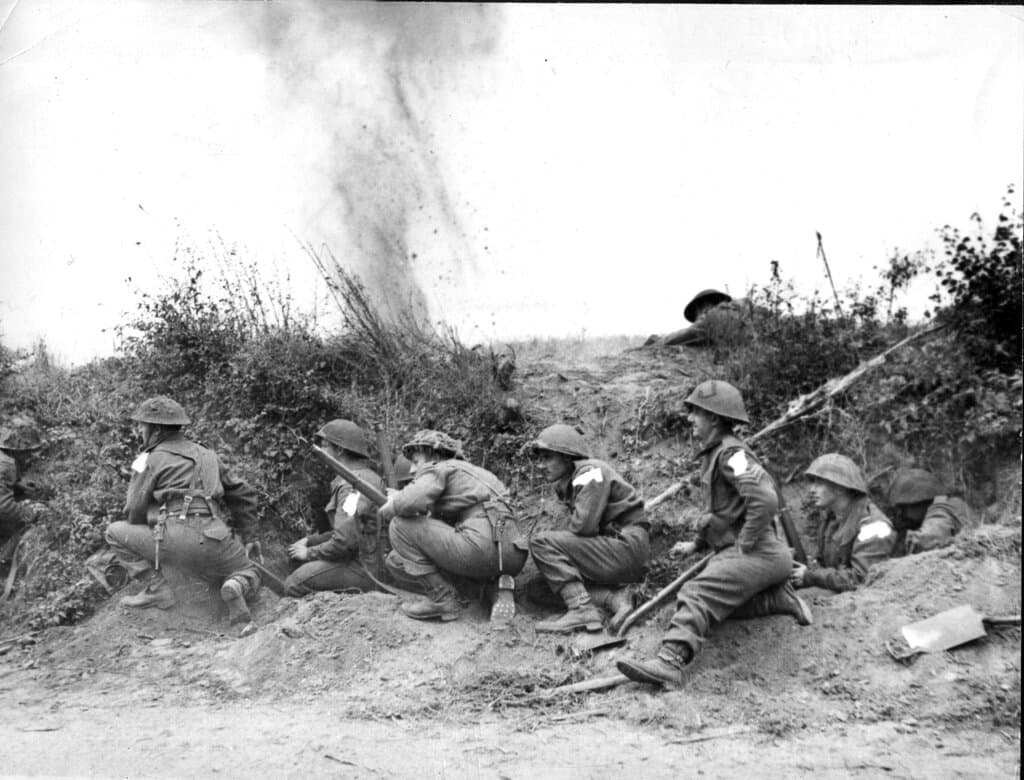War Is Terrible, Even When the Laws of War Are Observed
A righteous war cannot be levied by Queensbury rules.

“Everywhere I looked, there were caved-in houses, dead bodies on the ground, and people screaming. That same morning those same people had been living peacefully in their houses; in the blink of an eye, the town had turned into a lunar landscape.”
Those words were written not about Gaza in 2024, but about the Norman city of Caen in 1944. They describe one small chapter in an epic destruction suffered by local civilians during the liberation of Europe during World War II.
More than 25,000 French men, women, and children were killed during the battle for Normandy, mostly by British and American bombs. Those deaths were the unintentional by-product of a hard-fought campaign against resolute German troops who turned every hamlet, town, and city into a defensive strongpoint.
Should D-Day have been canceled for the sake of preserving those innocent French lives? The answer to that question should be self-evident to anyone. To abandon the invasion of Normandy would have meant consigning the occupied nations of Western Europe to perpetual Nazi tyranny.
“Here we are,” historian Victor Davis Hanson wrote in October, “78 years after the Holocaust and once again thuggish killers dressed in black are pulling Jewish elderly, women and children from their homes, executing them and throwing their bodies in the street.”
Unrelenting jihadi fanaticism means that Israel’s war in Gaza is a matter of existential necessity. Yet, as Israeli troops have fought their way through dense urban terrain above ground and 500 kilometers of tunnels below, they’ve made a concerted effort to minimize enemy non-combatant casualties. As Colonel Richard Kemp, who commanded British troops in Afghanistan, wrote: “The IDF does more to safeguard the rights of civilians in a combat zone than any other army in the history of warfare.”
To this end, the Israeli military provides warning of impending attacks as suggested by Article 26 of the 1907 Hague Convention. Israeli troops have also facilitated the evacuation of Gazan civilians from combat zones as recommended by America’s defense department’s 2023 edition of its “Law of War Manual.”
Israel’s desire to avoid non-combatant injuries is made far more difficult by the Palestinian terrorists. By storing munitions in hospitals and firing from schools, Hamas transforms those locations into legal targets for attack per Article 27 of the 1907 Hague Convention and Article 19 of the Fourth Geneva Convention, dating from 1949.
Palestinian gunmen also fight in civilian clothes, another violation of international law that endangers civilians by making it almost impossible for Israeli troops to distinguish between combatants and non-combatants.
The latest casualty figures from Gaza reflect Israel’s remarkable success in targeting armed enemies while minimizing civilian casualties. On May 8, the United Nations Office for the Coordination of Humanitarian Affairs tallied 24,686 confirmed deaths in Gaza since October 7.
The number of confirmed deaths excludes “more than 10,000 reported missing or under the rubble,” the UN notes. Of the number of confirmed deaths, Israel counts more than 15,000 as Hamas and Palestinian Islamic Jihad gunmen. Those figures translate into around 1.7 armed terrorists killed for each civilian death in Gaza.
Compare this statistic to the battle in 2016 and 2017 for Mosul in Iraq, where an Anglo-American-led task force caused the deaths of 10,000 civilians to kill 4,000 ISIS fighters — a ratio of 2.5 civilian deaths for each dead terrorist. Measured against any major military campaign in modern history, Israel’s war in Gaza constitutes a master class on maintaining respect for the laws of war while fighting a lawless enemy.
The fact that in World War II 430,000 German civilians were killed by Allied bombs as opposed to only 70,000 British civilians dying from Luftwaffe attacks does not confer righteousness on the Nazi regime.
Another fallacy revolves around the function of the Hague and Geneva Conventions. The laws of war were drafted to prohibit the most barbarous extremes of armed conflict such as hostage-taking, reprisal killings, rape, and pillage. They were not intended to transform armed combat into a bloodless contest waged under Marquis of Queensbury rules.
Even when Western militaries operate in compliance with international law, the essence of war remains as it always has been – a brutal business of meting out violence to force submission on an enemy. It’s a messy business too; a chaotic environment in which fear, confusion, and uncertainty generate battlefield errors that kill, not only civilians but friendly troops as well.

